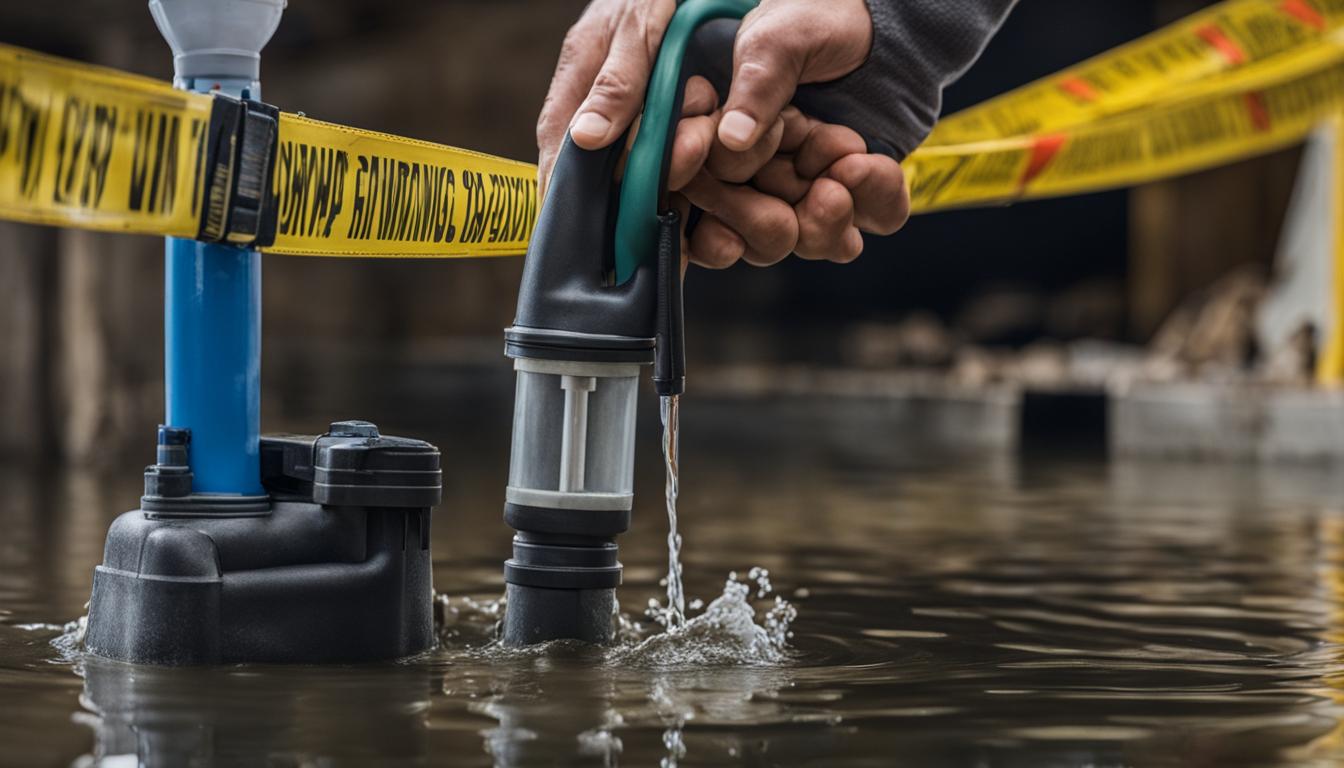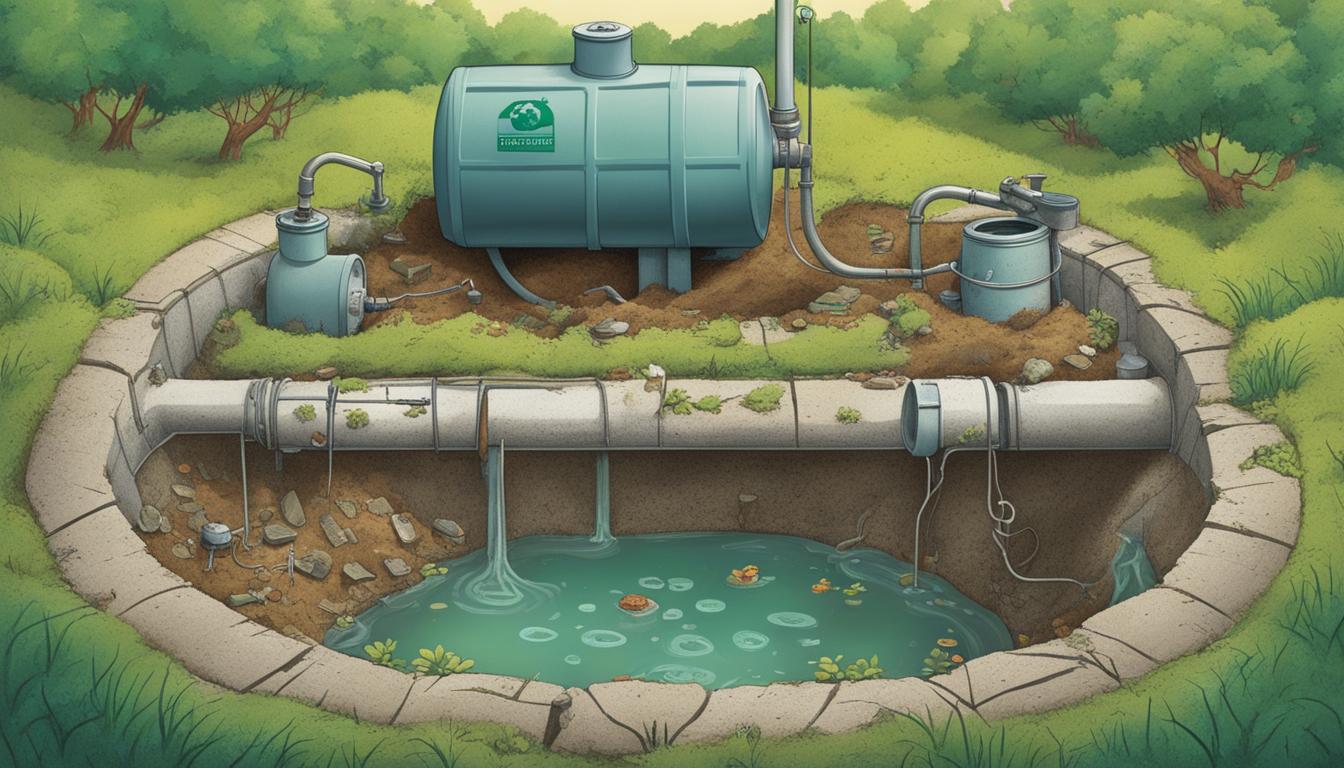As homeowners, it’s our responsibility to maintain our homes and properties in compliance with legal requirements. This includes ensuring that our septic systems meet the necessary regulations for treatment and disposal. Not only is adherence to these regulations important for environmental sustainability, but it also helps protect public health and safety.
In this section, we’ll explore the legal requirements for septic tank treatment and provide expert advice on how to ensure your septic system is compliant with the law. We’ll cover the necessary steps and regulations that need to be met, as well as provide guidance on testing and monitoring your system for optimal performance.
Key Takeaways:
- Meeting legal requirements for septic tank treatment is crucial for environmental sustainability and public health.
- Understanding the basics of septic tank systems and potential hazards associated with improper treatment is essential for compliance.
- Determining your specific legal obligations, including relevant laws, permits, and inspections, is important for compliance with septic care regulations.
- Regular maintenance, proper waste disposal, inspections, and documentation are key legal requirements for septic tank treatment.
- Testing and monitoring your septic system for microbial activity, nutrient levels, and overall performance is necessary for compliance and longevity.
Understanding Septic Tank Systems
At the heart of legal compliance for septic tank treatment lies a fundamental understanding of how septic tank systems work and why adhering to regulations is so important. A septic tank system is an underground wastewater treatment system that is responsible for removing impurities from household wastewater before releasing it back into the environment. Proper treatment is critical to protecting public health and the environment by preventing contamination of local water supplies with harmful pollutants.
Septic care laws are designed to ensure that these systems operate effectively without posing a threat to public health or the environment. Failure to comply with these regulations can lead to legal penalties and environmental harm.
Septic Tank System Components
A septic tank system consists of several essential components, including:
| Component | Description |
|---|---|
| Septic Tank | A water-tight tank that receives wastewater from the home, allowing solids to settle at the bottom while oils and grease float to the top. |
| Distribution Box | A junction box that distributes wastewater evenly among one or more drain fields. |
| Drain Field | A network of perforated pipes that allow the treated wastewater to be absorbed into the soil. |
The exact design of a septic tank system may vary depending on the size of the household, local regulations, and the specific site conditions.
Legal Septic Tank Treatment Practices
Legal compliance for septic tank treatment involves adhering to a set of best practices designed to ensure that the system operates safely and effectively. These practices include:
- Regular maintenance and pumping of the septic tank to prevent system failure and protect public health.
- Proper waste disposal to prevent contamination of the environment and local water supplies.
- Regular inspections of the system to identify any potential issues and ensure that it is operating correctly.
- Appropriate documentation of all maintenance, repairs, and inspections to demonstrate legal compliance.
Following these practices is critical to maintaining the safety and integrity of septic tank systems and avoiding legal penalties for non-compliance.
“Proper treatment is critical to protecting public health and the environment by preventing contamination of local water supplies with harmful pollutants.”
Determining Your Legal Obligations
It is crucial to understand your legal obligations when it comes to septic care regulations in your area. Compliance with these regulations ensures that your septic system is environmentally safe and in line with public health regulations. Every state and local municipality may have varying regulations, so it is essential to determine which requirements apply to your septic system.
- Researching Relevant Laws and Regulations: The first step in determining your legal obligations is to research the laws and regulations that apply to your septic system. You can find this information on government websites or by contacting your local health department. It’s essential to have a clear understanding of the regulations specific to your area, including permit requirements, inspection schedules, waste disposal guidelines, and any other relevant obligations.
- Consulting with Professionals: If you are uncertain about the regulations that apply to your septic system, it’s always a good idea to consult with a professional. Experts in septic care can help determine the legal obligations that apply to your system while providing advice on how best to comply with them. They can offer guidance on how to handle your septic system properly, recommend maintenance schedules, and provide you with the information you need to ensure compliance with legal regulations.
- Documenting Compliance: Documentation is a crucial component of legal compliance with septic care regulations. You need to maintain accurate records of all inspections, maintenance, and repairs conducted on your septic system. This documentation should include dates, descriptions of work completed, and the names of the professionals who conducted the work.
By researching the relevant laws and regulations, consulting with professionals, and documenting compliance, you can ensure that your septic system is in compliance with legal obligations. Failure to comply with these regulations can lead to severe environmental and public health risks, as well as potential penalties and fines.
Key Legal Requirements for Septic Tank Treatment
Meeting legal requirements for septic tank treatment is crucial for ensuring environmental safety and public health. To comply with the law, it’s necessary to understand the key legal requirements for septic tank treatment. In this section, we will outline these requirements and provide guidance on how to meet them.
Regular Maintenance
Regular maintenance is a critical aspect of septic tank treatment and a legal requirement. The frequency of maintenance depends on the septic tank’s size, the number of people in the household, and other factors. As a general rule, septic tanks should be pumped every 3-5 years. It’s also essential to have a licensed professional inspect the tank regularly to ensure it’s functioning correctly. Proper maintenance not only ensures legal compliance but also prolongs the life of your septic system.
Proper Waste Disposal
Proper waste disposal is another key legal requirement for septic tank treatment. All waste that goes into the septic tank, including toilet water, should be biodegradable. It’s crucial to avoid dumping hazardous chemicals, medicines, and non-biodegradable substances down the drain. Failure to do so can contaminate groundwater and surface water, leading to health problems. Additionally, it’s necessary to have a functional drain field to ensure proper wastewater disposal.
Inspections
Regular inspections are a legal requirement for septic tank treatment. Inspections must be performed by a licensed professional and should occur every three years. During inspections, the professional may examine the tank’s physical condition, check for any leaks, and test system functionality to ensure compliance with legal requirements.
Documentation
Documentation is a vital aspect of legal compliance with septic care regulations. You must keep a record of all maintenance and inspection activities, including dates, results, and any necessary repairs. Accurate documentation helps to ensure no legal requirements are missed and simplifies the inspection process.
In conclusion, understanding and meeting the key legal requirements for septic tank treatment is crucial for ensuring environmental safety and public health. Regular maintenance, proper waste disposal, inspections, and documentation are just some of the necessary steps to ensure legal compliance. By following legal requirements, you can prevent environmental contamination and avoid any potential legal penalties.
Testing and Monitoring Your Septic System
Regular testing and monitoring of your septic system is crucial for maintaining legal compliance. It’s essential to ensure that your system is operating correctly and adhering to the legal regulations to protect the environment and public health.
Here are some legal septic tank treatment practices that you need to consider:
Testing for Microbial Activity
Testing for microbial activity is essential as it determines whether the bacteria in your system are breaking down the waste correctly. Ideally, there should be abundant oxygen levels and a balanced concentration of microbial organisms to aid the decomposition process.
You can use commercially available test kits to measure the levels of microbial activity in your septic system. These tests will help you identify any issues that may impact the system’s performance and take corrective actions timely.
Monitoring Nutrient Levels
The presence of excess nutrients in the septic system can cause serious environmental hazards. Nutrients, such as nitrogen and phosphorus, can get into the groundwater and nearby water bodies that result in the proliferation of algae and other harmful organisms.
You can have the nutrient levels in your septic system monitored regularly by an expert septic care professional. They can help you identify any nutrient buildup that may cause harmful effects and take the necessary steps to control the same.
Assessing Overall System Performance
It’s essential to assess the overall performance of your septic system regularly. A poorly functioning system can lead to system failures, backups, and environmental risks.
Professional septic care services can conduct assessments to determine whether your system is functioning correctly and identify any potential issues. They’ll provide advice on corrective actions to be taken to keep your system functioning and ensure compliance with legal regulations.
Additionally, keeping detailed records of your testing and monitoring activities is critical for legal compliance. It helps you keep track of the septic system’s performance, identifying issues, and ensuring timely corrective measures are taken.
Implementing Best Practices for Legal Compliance
Following the legal requirements for septic tank treatment is essential, but implementing best practices can also help ensure the longevity and efficiency of your system. By adopting eco-friendly practices and establishing a proper maintenance schedule, you can maintain compliance with septic care regulations and protect the environment at the same time.
Proper Maintenance Schedule
Maintaining a regular maintenance schedule is essential for ensuring your septic system operates efficiently and complies with legal obligations. This schedule should include regular pumping and inspection of your septic tank by a licensed professional. As a general rule, septic tanks should be pumped every three to five years, depending on the size of the tank and the number of users in your household. Engage a licensed professional to determine the right maintenance schedule for your septic system.
Waste Management Strategies
Proper waste management is crucial for ensuring legal compliance and protecting the environment. Avoid flushing non-biodegradable materials down the toilet or sink, such as hygiene products, oil, grease, and medication. Additionally, minimize the use of harsh chemicals that can disrupt the balance of bacteria in your septic tank. Eco-friendly alternatives can be used, or biodegradable products may be the best option.
Use of Eco-Friendly Additives
The use of eco-friendly additives can help maintain the balance of bacteria in your septic system and improve system performance. However, it’s crucial to choose the right supplements. Avoid harsh chemicals that can cause damage to your system or disrupt the natural breakdown of waste. Biodegradable or eco-friendly alternatives are the best options and provide the added bonus of being environmentally sustainable.
Optimizing Water Usage
Reducing water usage can help minimize the strain on your septic system. Simple practices such as repairing leaky faucets, opting for low-flow fixtures, and avoiding excessive water usage can help maintain the longevity of your septic system and ensure legal compliance.
Resources for Assistance and Guidance
At times, complying with septic care regulations can be overwhelming. However, there are several resources available to assist you in meeting legal requirements for septic tank treatment. Some of these resources include:
Government Agencies
Various government agencies at the local, state, and federal levels provide regulatory guidelines and support for septic care compliance. For instance, the Environmental Protection Agency (EPA) offers a wide range of resources and guidelines on its website, including a SepticSmart program that educates homeowners on proper septic system maintenance and care. Furthermore, state and local environmental agencies have resources and programs that can help you meet legal requirements.
Professional Organizations
Several professional organizations offer assistance and guidance to homeowners and businesses to ensure their septic system is law-compliant. For example, the National Onsite Wastewater Recycling Association (NOWRA) provides extensive education and training resources to promote proper septic system care and maintenance. Additionally, the National Environmental Health Association (NEHA) offers a vast range of resources in the field of environmental health, including septic tank treatment.
Online Platforms
Online platforms such as SepticSystem.com provide valuable resources and support to homeowners and businesses concerning septic tank treatment. These platforms offer instructional videos, articles, and other educational materials, as well as forums where users can seek advice from experts and other homeowners.
By utilizing these resources, you can gain valuable assistance and guidance on how to comply with septic care regulations and ensure the proper maintenance of your septic system.
Staying Up-to-Date with Changing Regulations
At the core of meeting legal requirements for septic tank treatment is ensuring compliance with current regulations. Regulations can change frequently, which is why it’s essential to stay up-to-date with any changes that may affect your septic system.
One way to stay up-to-date with changing regulations is to monitor relevant government agency websites frequently. This will provide you with the most recent updates and guidelines on septic tank treatment. Additionally, attending relevant training or workshops can provide valuable insights and opportunities to connect with industry professionals who can offer guidance on navigating changing regulations.
Another helpful tool for staying up-to-date with changing regulations is leveraging technology. Neural matching algorithms can assist in adhering to septic care laws by identifying semantic meaning in regulatory language and providing actionable guidance.
By staying informed about changing regulations, you can adapt your septic system management practices to ensure continued compliance and avoid potential penalties or hazards.
Conclusion
Meeting legal requirements for septic tank treatment is crucial for both the environment and public health. Throughout this article, we have provided valuable insight and advice on ensuring your septic system is compliant with the law.
By understanding the basics of septic tank systems, determining your legal obligations, and adhering to key legal requirements, you can mitigate any potential risks or penalties associated with non-compliance.
Regular testing and monitoring of your septic system, implementation of best practices, and staying informed about changing regulations are also essential for maintaining legal compliance.
At the end of the day, ensuring legal septic tank treatment practices is a shared responsibility between septic system owners and regulatory bodies. Let’s work together to protect the environment and promote public health by following legal guidelines and best practices.
FAQ
What are the legal requirements for septic tank treatment?
The legal requirements for septic tank treatment vary depending on your state and local regulations. However, some common requirements include regular maintenance, proper waste disposal, inspections, and documentation. It’s important to research and understand the specific laws and regulations in your area to ensure compliance.
How do septic tank systems work?
Septic tank systems are underground wastewater treatment structures. They consist of a septic tank, where solid waste settles and is broken down, and a drainfield, where liquid waste is absorbed into the ground. The system relies on natural processes to treat and dispose of wastewater from toilets, showers, sinks, and other household sources.
How can I determine my legal obligations for septic tank treatment?
To determine your legal obligations for septic tank treatment, you should research the laws and regulations specific to your state and local municipality. This may include obtaining permits, scheduling inspections, and adhering to specific maintenance requirements. Contacting your local health department or a septic system professional can also provide valuable guidance.
What are the key legal requirements for septic tank treatment?
The key legal requirements for septic tank treatment typically include regular maintenance, proper waste disposal, inspections, and documentation. Regular pumping of the septic tank, proper use of water and waste, adherence to setback requirements, and keeping records of maintenance and repairs are important to meet legal compliance.
Why is testing and monitoring important for septic systems?
Testing and monitoring your septic system are crucial for maintaining compliance with legal requirements. By testing for microbial activity, nutrient levels, and overall system performance, you can identify potential issues early on and take necessary corrective measures. Proper documentation and reporting of test results help demonstrate adherence to regulations.
What are the best practices for legal compliance with septic tank treatment?
Best practices for legal compliance with septic tank treatment include following a regular maintenance schedule, practicing proper waste management, and using eco-friendly additives. It’s also important to avoid flushing non-biodegradable items, conserving water to prevent overloading the system, and addressing any issues promptly.
Where can I find resources for assistance and guidance on legal septic tank treatment?
There are several resources available for assistance and guidance on legal septic tank treatment. Government agencies, such as local health departments, provide educational materials, guidelines, and support. Professional organizations, like septic system associations, offer valuable resources and networking opportunities. Online platforms and forums can also provide helpful information.
How can I stay up-to-date with changing regulations for septic tank treatment?
Staying up-to-date with changing regulations for septic tank treatment is important to ensure continuous compliance. Monitor regulatory updates through government websites or subscribe to relevant newsletters. Attend training or workshops offered by local health departments or professional organizations. Leverage technology, such as mobile apps or online tools, for compliance reminders and updates.







